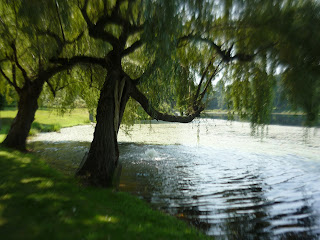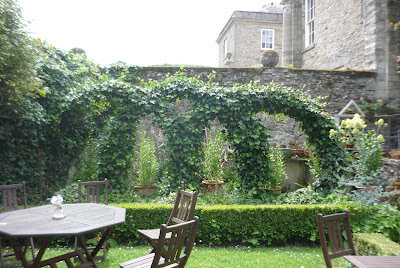"What?"
"Well, p'rhaps it should be numinosity? Anyway, some of that whaddyacallit - immanence?"
"What, that sense of a frozen moment in time when you're in some sort of presence? Is that the kind of thing you mean?"
"Well yes, but I don't want it to be a real presence, just a feeling of it - you know? Just that sort of feeling. That sort of everything's imbued with meaning feeling."
"Oh, I know. Awe. Delight. Significance. That sort of thing."
"Exactly. Look forward to seeing your ideas!"
Well, there you are. That's our subject of the day, of the moment, of ever, of always. A fleeting eternity. The Piper at the Gates of Dawn. Looking through my many photographs, I can pick out from memory those that mark moments when I thought that feeling was there, but so few pictures are able to capture it. And those that seem to me to do so may not convey the transcendent moment to anyone else.
It's interesting to consider what sort of elements might tickle a person's visionary cortex. First, you need a sense of rootedness at a still centre. And a feeling of hugeness, spinning into space. And beyondness - seeing through, beyond, out to the really real. Hidden depths of meaning in the ordinary. A sense of impending arrival helps. In the picture above, from Lissard in County Cork, the tracery of paths suggests a circling presence.
Of course this rather spiritual theme skirts appallingly close to a decadent variety of pantheism, or even something more personalised. Well I'm not having any of that - god-shaped spaces abound in our heads and the feeling of packing something in there can be good. Landscape's a nice fit, that's all it means to me.
Ah but it's lovely, that feeling of searing significance and connection to something beyond yourself. In this next case there was invitation too. It's the woodland edge at the Herb Farm in Staplehurst.
Today's song, Lay Down Your Weary Tune, from Biograph seems like something that could not have been invented. It feels like something that always existed - one written by Anon in the mists of history. Do try it. If you don't already know it, I hope you will be staggered by its perfection and its completeness. It's about music and it's about being transported. It's about the universe and nature, banging and booming around a magical still centre, where a guitar is played and the guitar player sings. And he sings about being in the natural world and ceasing to play his guitar, hearing a greater music instead.
And yet, you know, I don't listen to it often, and I would hate to hear it performed by someone who didn't understand how subtly distinct each chorus must be. It's a timeless tune alright, one that could drill into your brain and drive you crazy.
As a child, I remember listening to Ten Green Bottles and feeling I could not stand it, that sense of time slowing down, plod plod plod through the verses, knowing exactly where the note will land, knowing what will happen next, wishing to be anywhere else, really truly ANYWHERE else, desperate to get out of the snares of this terrible tune thumping in my head, like Gulliver held down.
How close to that particular wind Dylan's song steers. He rescues it though, young though he is; his commitment, his energy, some unexpected words and intonations; all these contrive to acheive something pretty near to the transcendence he sings about. Would that a garden could get that close in nature.
Back-lighting could help. It doesn't always - sometimes it just looks like back-lighting.
Other-worldliness, that's another way of putting this thing that we're searching for. Dawn may be another way of laying hold of it, a way which figures astonishingly infrequently amongst my pictures or memories.
At Parcevall Hall, in Yorkshire UK one can look directly across a valley to a rather Elvish, other-worldly landscape. The garden itself is beautifully resonant and unified, but not otherworldly. Domestic architecture and gardens, on the whole they don't invite the numinous.
Here's the valley landscape, not "natural" of course, nothing ever really is. But do you get that feeling?
If we listen to the song again, we'll hear that it is riven with natural sounds and sights. Rain and clouds, breezes, oceans, rivers and trees - the only man-made things in it are musical instruments.
And gardens can let nature in, or imitate it; surely enough to suggest the transcendent. Strength, presence and size -sometimes they bring it closer. Here are two from Innisfree in NY State, where heaven feels pretty near. The rocks and the bubble in the lake are only two of the timeless moments. You circle the lake, feeling as if you've stepped into a world of signifiers; everything is glowing with meaning and immanence.
Dylan is right when he equates strength with rest. In this next picture, for I can't think now how to leave any of these out, you feel small, but not in a bad way, not dwarfed or dominated, more like rightly placed in a majestic world. This is from Duncombe Park in Yorkshire, UK.
Light and a changing sky, they put you in your place and join you to the music swirling through the clouds.
Here's Scampston Hall, not the famous Walled Garden where visitors glory in the flowers, but the outer reaches, where eventually you find a river that runs smooth and hymn-like. Here the grasses waved at the far end of the manicured vista - the storm-clouds lowered and I felt singled out for a special moment.
And finally, a bronze sleeper. This lady has heard the song. She rests, supported by the strength of her hair, under the trees, above the water, unbound by laws. She has laid down her weary tune and hears only what no voice could hope to hum.
She is from Charleston in Sussex, UK, where Vanessa Bell and Duncan Grant decorated everything they could lay their hands on. Her rest was called for perhaps, her weariness mitigated by the peace of the garden. Listen to the song, you may feel a spreading peace invade you too.



































